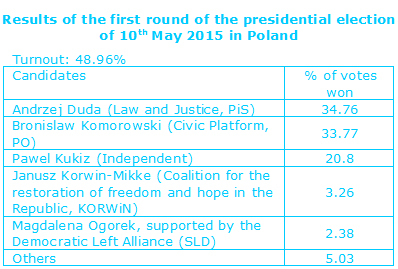Results
Elections in Europe
Corinne Deloy
-

Available versions :
EN

Corinne Deloy
Opposition candidate, Andrzej Duda (Law and Justice, PiS), was the source of surprise in the first round of the presidential election that took place on 10th May in Poland, i.e. two days after the commemoration of the 70th anniversary of the end of the Second World War. Andrzej Duda, MEP (ECR, PL) indeed came out ahead in the election with 34.76% of the vote ahead of outgoing President of the Republic, Bronislaw Komorowski (Civic Platform PO) who had been forecast the winner in the pre-electoral polls - he won 33.77% of the vote. Decidedly electoral evenings have followed one another and resemble each other. Three days after the UK the Poles have confounded the pollsters, which failed in their election forecasts.
The other surprise in this election: independent candidate Pavel Kukiz, a rock singer, actor and a regional MP from Lower Silesia - who likes to challenge both the PO in office and the PiS, as he hopes to "give the State back to its citizens" came third in the election with 20.8% of the vote. Pavel Kukiz, who has said he would like to form a political party before the general elections in the autumn, attracted many young people, notably amongst the poorest classes.
In his second presidential bid Janusz Korwin-Mikke (Coalition for the Restoration of Freedom and Hope in the Republic, Koalicja Odnowy Rzeczypospolitej Wolność i Nadzieja, KORWiN) improved his result of 20th June 2010 by two points. The MEP (NI, PL) won 3.26% of the vote.
The evening also heralded the disappearance of the Polish left since Magdalena Ogorek, the candidate supported by the Democratic Left Alliance (SLD) but who was also standing as the representative of the entire left-wing won 2.38% of the vote. "Magdalena Ogorek's defeat will mark the final end of the post-communist left" declared political analyst Eryk Mistewicz before the presidential election.
The six other candidates - Janusz Palikot (Your Movement, TR), Adam Jarubas (People's Party, PSL), Grzegorz Braun, Marian Kowalski (National Movement, RN), Pawel Tanajno (Direct Democracy, DB) and Jacek Wilk (Congress of the New Right, KNP) - won under 2% of the vote.
Turnout fell by 6 points in comparison with the first round of the presidential election on 20th June 2010, lying at 48.96%.
Bronislaw Komorowski and Andrzej Duda will face each other in a second round which will take place in two weeks, i.e. on 24th May next.
As soon as he learned of the official results outgoing President of the Republic Bronislaw Komorowski immediately qualified his performance as a "serious warning to those in office and to those who want a rational Poland" and announced that he would put forward proposals the very next day "for those who were disappointed and who were expecting change and a faster modernisation of the country." "We must listen to the electorate because we have to mobilise all of the rational forces in Poland," he added.
The outgoing Head of State enjoyed a comfortable lead over his rival in the polls for a long time (some analysts even thought he would win in the first round) but this diminished as the weeks went by and as the first round of the election approached. His refusal to debate with his rivals was also misunderstood by his fellow countrymen.
"Bronislaw Komorowski's electoral campaign was very weak. His team totally neglected the power of his opponents," maintained political expert Stanislaw Mocek. Eryk Mistewicz also notes that the outgoing Head of State was only supported by people who had benefited from Poland's recent development. "Bronislaw Komorowski is the only candidate who thinks that Poland has greatly benefited from its newly recovered freedom whilst all of the others represent the discontented," he stressed before the election. This is a dangerous situation indeed.
The presidential election is taking on specific importance in view of the upcoming parliamentary election that will take place in Poland in the autumn, possibly in October. The campaign for these elections will start after the appointment of the President of the Republic. In this context Andrzej Duda's victory on 24th May next would strengthen the PiS. Whatever the outcome Bronislaw Komorowski's poor performance in the first round is already a serious warning for the government led by Prime Minister Eva Kopacz (PO).
On the same theme
To go further
Elections in Europe
Corinne Deloy
—
15 April 2025
Elections in Europe
Corinne Deloy
—
25 February 2025
Elections in Europe
Corinne Deloy
—
18 February 2025
Elections in Europe
Corinne Deloy
—
28 January 2025

The Letter
Schuman
European news of the week
Unique in its genre, with its 200,000 subscribers and its editions in 6 languages (French, English, German, Spanish, Polish and Ukrainian), it has brought to you, for 15 years, a summary of European news, more needed now than ever
Versions :




